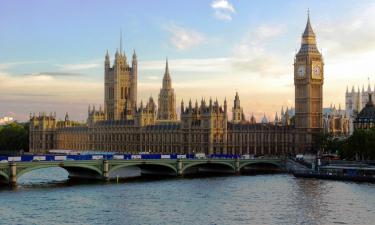Diplomats say: Europeans to offer new talks on enriching in Russia to Iranians
Three leading European nations and Moscow may offer to meet with Iranian officials next month in attempt to salvage a plan that would deprive Tehran of directly controlling sensitive nuclear technology by moving it to Russia, diplomats said Tuesday.
The diplomats said senior French, British and German officials had tentatively agreed on Dec. 6 as a possible date for a meeting with Iranian negotiators, in what would be the first such talks since negotiations between the so-called "EU-3" and Tehran broke off in August. Russia also would likely participate, they said.
But the diplomats who demanded anonymity in exchange for discussing confidential strategy on engaging Iran said new talks would be offered only if Iran did nothing before Dec. 6 to increase international concerns that it is interested in developing nuclear arms.
"They've decided to go the extra mile," a European diplomat accredited to the Vienna-based International Atomic Energy Agency told The Associated Press of the decision by the "EU-3."
The Europeans broke off talks with Tehran in August after it restarted conversion, a prelude to uranium enrichment _ a process that can create either energy or the weapons-grade core of nuclear warheads.
A proposal floated a few weeks ago foresees the Iranians agreeing to move actual enrichment activities to Russia which, in theory, would ensure that Tehran cannot misuse the technology for a weapons program.
Iran insists it is interested only in generating power through enrichment, but international concern is increasing that it could harness it to make weapons.
With the Europeans insisting since August that Iran would have to re-suspend conversion, their plan to reach out anew to the Iranian was a major concession.
It came just a day after revelations that Washington and its European allies would forgo pushing for Iran's referral to the U.N. Security Council when the 35-nation IAEA board meets on Thursday, in order to give Russia more time to persuade Tehran to sign on to the enrichment proposal.
Diplomats and U.S. and European government officials told The AP that Washington, Britain, France and Germany would instead settle for a statement critical of recent IAEA findings showing the Iranians in possession of what appeared to be drawings of the core of an atomic warhead and of other worrying nuclear activities.
For the Americans and the European Union, the plan to move Iran's enrichment to Russia holds the promise of success even if Iran continues to reject the proposal.
If the Russians fail to win over the Iranians, Washington and the Europeans hope Moscow and other key board members of the International Atomic Energy Agency now opposed to Security Council referral will moderate their opposition.
Russia, Iran's key partner in building Tehran's first nuclear power plant, has considerable clout with Tehran, but the officials and diplomats said other considerations also went into the decision to postpone a showdown on referral at the board meeting opening Thursday.
Belarus, Cuba and Syria joined Venezuela on the IAEA board in September. With those anti-U.S. nations on board, any vote on referral would be more strongly opposed than the resolution passed at the last board meeting two months ago that cleared the path for hauling Iran before the council by declaring its past activities in violation of the Nuclear Nonproliferation Treaty.
With President George W. Bush under growing criticism from the war in Iraq, his administration was ready to wait and build international consensus over what to do about Iran rather than settle for the negative implication of a narrow board vote on referral, a U.S. official suggested.
Moscow's support is particularly important. It and China wield vetoes on the Security Council, and as such could cripple any attempt to pressure Iran to compromise on its nuclear activities through sanctions or political pressure, reported AP. P.T.
Subscribe to Pravda.Ru Telegram channel, Facebook, RSS!




